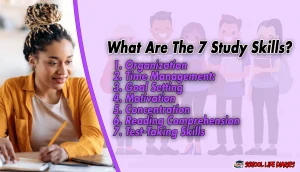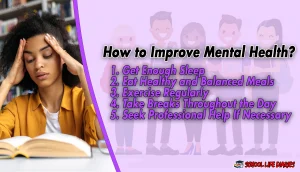Study skills are the abilities that students use to learn and retain information. They include things like taking notes, preparing for exams, and managing time. Often, students must develop their own study skills in order to be successful in school. There are many resources available to help students learn about and improve their study skills, including books, websites, and teachers.
What Are The 7 Study Skills?
The seven study skills are Organization, time management, goal setting, motivation, concentration, reading comprehension, and test-taking skills.
1. Organization:
Students who are organized have an easier time succeeding in school. They are able to keep track of their assignments, materials, and due dates. When everything has a place, it is less likely to get lost. Organized students tend to feel less stressed because they know what is expected of them and where to find things when they need them.
2. Time Management:
Time management is a critical skill for students to learn. It is especially important in college, when classes, work, and social activities can all compete for time. Those who can manage their time well are more likely to be successful in school and in their careers. They are less likely to feel overwhelmed by their workload and more likely to be able to complete their assignments on time.
3. Goal Setting:
Setting goals is an important part of any successful endeavor. Students who set goals for themselves are more likely to achieve them than those who do not. Goals give direction and focus to your efforts. They can also motivate you to keep going when the going gets tough.
4. Motivation:
Motivation is what drives you to achieve your goals. It is the desire to do something, even when it is difficult. Motivated students are more likely to be successful in school than those who are not motivated. They are more likely to put forth the effort necessary to complete their assignments and get good grades.
5. Concentration:
Concentration is the ability to focus your attention on a task. It is important for students to be able to concentrate when they are studying or doing homework. Those who can concentrate well are more likely to retain information and do well on tests.
6. Reading Comprehension:
Reading comprehension is the ability to understand what you read. It is an important skill for students to develop, as it will help them in all their classes. Those who can comprehend what they read are more likely to do well on tests and in their careers.
7. Test-Taking Skills:
Test-taking skills are the ability to do well on exams. It is important for students to learn how to prepare for and ability to take the test.
A Better Way to Study Through Self-Testing and Distributed Practice
It’s important to find a way to study that works for you. Some people like to study in big blocks, while others prefer to break it up and spread out their studying. There’s no wrong way to do it, as long as you’re getting the work done. A good way to mix things up is to use both self-testing and distributed practice.
Self-testing is when you test yourself on material that you’ve already studied. This can be done in a number of ways, such as through flashcards or practice problems. Distributed practice is when you break up your studying into smaller chunks and spread it out over time. This can be helpful for retaining information over long periods of time.
New Studies Show What Sleep Loss Does To The Brain And Cognition
The study, which was published in the journal Science Advances, looked at how sleep loss affects the brain. The researchers found that sleep deprivation can lead to changes in the brain’s white matter. White matter is responsible for communication between different parts of the brain.
The researchers also found that sleep deprivation can lead to a decrease in cognitive function. This means that people who are sleep-deprived may have problems with memory, learning, and thinking abilities. So what can you do to make sure you get enough sleep?
Here are a few tips: Make sure your bedroom is dark and quiet. Avoid watching TV or using electronic devices in bed. Keep a regular sleep schedule. Avoid caffeine and alcohol before bedtime. Get up and move around every few hours to keep your body active.
Techniques to Improve Your Study Habits
1. Set clear and achievable goals:
Setting clear, achievable goals is essential for studying effectively and improving your study habits. Start by breaking down your overall goal into smaller achievable targets that you can work towards gradually. This will help to keep you motivated and on track with your studies, allowing you to measure progress as you go.
2. Find the right environment:
It’s important to create a comfortable and productive study environment for yourself. Make sure that you have good lighting, a comfortable chair, and minimal distractions such as noise or clutter. If possible, try to find a quiet place where you can focus on your studies without interruption.
3. Schedule regular breaks:
Taking regular breaks while studying can help you stay focused and energized. Allowing yourself a few minutes to rest and recharge will make it easier to absorb what you’re learning. If possible, take longer breaks in the evening so you have time to relax and unwind before getting back to your studies.
4. Utilize study aids:
Taking advantage of various study aids can help you get the most out of your studying sessions. Consider using flashcards, online quizzes, or other resources to help reinforce what you’re learning. You may also want to invest in a good set of headphones or noise-canceling earbuds for more focused studying.
5. Reach out for help:
Don’t be afraid to ask for help if you need it. Talk to your professor or a tutor if you have questions about the material or just need someone to talk to. It can also be helpful to form study groups with other students in the same course, as this can make studying more enjoyable and result in better retention of the material.
How to Improve Mental Health?
1. Get Enough Sleep:
It’s important to get enough sleep so that your body can rest and recover from the day. Most people need around eight hours of sleep per night. If you find it difficult to fall asleep, there are a few things you can try:
- Establish a regular sleep schedule and stick to it as much as possible.
- Keep a cool, comfortable environment in your bedroom.
- Avoid watching television or working on the computer in the hours leading up to bedtime.
- Limit your caffeine intake and avoid drinking alcohol before bed.
2. Eat Healthy and Balanced Meals
Eating healthy foods is important for your physical and mental health. Make sure to include plenty of fruits, vegetables, and whole grains in your diet. It’s also important to limit your intake of sugary, fatty, and processed foods.
3. Exercise Regularly
Exercise is not only good for your physical health, but it can also improve your mental well-being. A moderate amount of exercise is the key to maintaining your health. Try to get at least 30 minutes of exercise most days of the week.
4. Take Breaks Throughout the Day
It’s important to take breaks throughout the day to give your mind a rest. If you’re working on a project, take a five-minute break every hour. Get up and walk around, or do some deep breathing exercises.
5. Seek Professional Help If Necessary
If you’re struggling with a mental health issue, it’s important to seek professional help. There are many qualified professionals who can help you get on the road to recovery. Don’t be afraid to ask for help if you need it.
12 Ways To Keep Your Brain Young
1. Exercise your brain:
Like any other muscle in your body, your brain needs exercise to stay healthy and function well. Make a point to do puzzles, play games, and learn new things.
2. Eat a healthy diet:
Eating nutritious foods helps keep your brain healthy and functioning at its best. Include plenty of fruits, vegetables, and whole grains in your diet, and avoid processed foods and sugary drinks.
3. Get enough sleep:
Getting enough sleep is essential for good brain health. Most adults need around eight hours of sleep each night.
4. Stay hydrated:
Drink plenty of water each day to keep your brain hydrated and functioning properly.
5. Avoid smoking and drinking alcohol excessively:
Smoking and drinking alcohol can damage your brain cells and lead to neurological problems.
6. Protect your head:
Traumatic head injuries can cause long-term damage to your brain cells and affect your cognitive abilities. Wear a helmet when playing sports or biking, and avoid falls by using safety precautions around the home.
7. Manage stress levels:
Stress can have a negative impact on your brain health, so find ways to manage it effectively. practices like yoga or meditation can help reduce stress levels and improve overall well-being.
8. Get regular checkups:
Regular checkups with a doctor can help identify any potential problems with your brain health early on, which can be treated before they become more serious issues.
9. Take care of your mental health:
Mental health is just as important as physical health, and it’s crucial to take care of both equally. If you’re feeling stressed out or down, talk to someone about it – whether that’s a friend, family member, or therapist – to get the support you need for better mental health.
10. Socialize regularly:
Socializing with friends and family is a great way to keep your mind active and engaged. Spending time with loved ones allows you to share memories and experiences while also stimulating your mind through conversation.
11. Stay mentally:
Active Mental activity keeps the mind stimulated and healthy. Challenging yourself mentally with activities like Sudoku puzzles or learning a new language can help keep your brain sharp.
12. Use technology wisely:
While technology has many benefits, it can also be harmful to our brains if we’re not careful. Limit screen time – especially for children – to prevent negative effects on our cognitive abilities.
Study and Learning Skills For Online Classes
In order to be successful in online classes, it is important to have strong study and learning skills. Some key skills to focus on include:
1. Persistence:
It is important to keep going even when things get tough. Don’t give up when you hit a roadblock; find a way to work through it.
2. Time Management Skills:
Make a plan and stick to it. This includes setting aside time for studying as well as for breaks and relaxation.
3. Effective and Appropriate Communication Skills:
In an online class, you will be interacting with your instructor and classmates primarily via email or discussion boards. Be sure to communicate clearly and effectively.
4. Basic Technical Skills:
Most online classes require basic computer skills, such as using a web browser, sending emails, navigating websites, etc. Be sure you are comfortable with these basics before starting your course.
5. Reading and Writing Skills:
In order to succeed in an online class, it is important to be able to read and write at a high level. Be sure you are comfortable with academic reading and writing tasks.
6. Motivation and Independence:
Online classes can be challenging, but they are also very rewarding. Be prepared to work hard, but also be prepared to take ownership of your learning process and succeed on your own terms.
Is it OK to listen to music while studying?
Yes, it is OK to listen to music while studying. In fact, some people find that listening to music can help them focus on their work. However, it is important to make sure that the music you are listening to is not too distracting and that you are still able to concentrate on what you are doing.
How To Assess Student Research & Study Skills?
1. Ask students to complete a self-assessment survey at the beginning and end of the semester to track their progress in research and study skills.
2. Observe students’ research and study habits during class and ask them to reflect on their own progress.
3. Give students weekly or monthly assignments to work on independently, such as researching a topic or writing a paper, and provide feedback on their progress.
4. Have students complete a case study or research project and submit it for grading.
5. Assess student comprehension of research and study skills through exams or other assessment tools.
6. Foster a love of learning by modeling enthusiasm for research and study in your own classes.
7. Encourage students to ask questions and seek help when they need it.
8. Promote collaboration among students by having them work together on research projects or study groups.
9. Help students develop time management skills by teaching them how to plan and schedule their time.
10. Reward students for their progress in research and study skills with positive feedback and reinforcement.
Related Article: HOW TO ENCOURAGE FAILING STUDENTS TO SUCCEED IN LIFE?
Teaching Study Skills To High School Students
In order to get good grades in high school, it is important to know how to study.
1. Find a quiet place to focus:
This means finding a place where you can be alone and free from distractions. It could be a room in your house, the library, or even outside. Make sure to turn off your phone and any other electronics that might distract you.
2. Read the material:
This means actually reading and understanding the material. Don’t just skim over it. Take your time to really understand what you’re reading. If you have trouble understanding something, ask your teacher or a friend for help.
3. Take Notes:
When you’re reading, be sure to take notes. This will help you remember what you read and make it easier to review later on.
4. Practice tests:
In order to do well on tests, it is important to practice them. You can find practice tests online or in textbooks. Take a few and see how you do. If you need more help, ask your teacher for extra credit work.
Study Skills For Middle School: Activities & Ideas
As a middle school student, it’s important to develop good study habits. Here are some activities and ideas to help you get started:
1. Establish a routine:
Try to study at the same time each day. This will help your body and mind get into the habit of studying.
2. Create a study space:
Make sure your space is quiet and comfortable, so you can focus on your work.
3. Get organized:
Make sure you have all of the materials you need before you start studying. This will help avoid frustration and wasted time.
4. Take breaks:
It’s important to take short breaks throughout your study session, so you don’t get overwhelmed or exhausted.
5. Stay motivated:
Find a study buddy or set goals for yourself, so you can keep pushing yourself forward.
Final Verdict:
Study skills should be part of every student’s and teacher’s educational curriculum. They are essential in order to improve and maintain a student’s academic performance, as well as gain lifelong learning benefits. Such skills encompass not only what the traditional concept of studying entails, but also managing time, being organized, taking notes effectively, and reading actively.
Understanding these concepts can empower learners of all ages and backgrounds to succeed in their various studies. It is important for students and teachers alike to be aware of how beneficial developing study skills can be not only for their current academic success but also for betterment in life after school.








